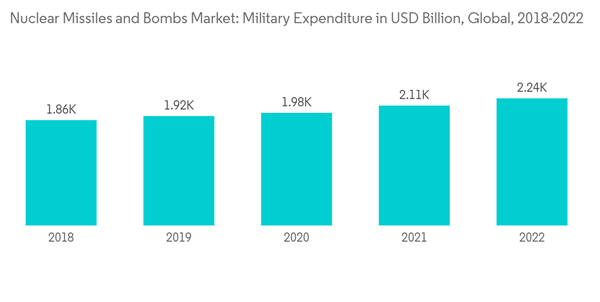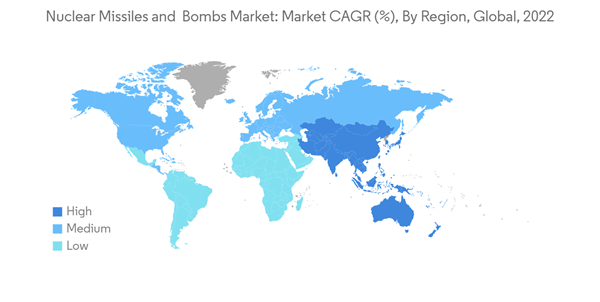The increasing military expenditure and the rising threats for various nations due to border security issues and the growing terrorism, along with the advancements in hypersonic missile technologies are the major factors anticipated to drive the growth of the market. Companies have adopted collaboration, long-term agreements, joint ventures, and associations with the Atlantic Council, Brookings Institution, and Carnegie Endowment for International Peace as their key development strategies in the nuclear bombs and missiles market. However, the treaty on the prohibition of nuclear arms, which is intended to prohibit the use of nuclear weapons, may restrain the market growth during the forecast period.
Nuclear Missiles And Bombs Market Trends
Nuclear Missiles
The nuclear missiles segment is expected to lead the market share owing to the advantages of missiles over bombs and rising defense expenditures. According to the Stockholm International Peace Research Institute (SIPRI), the global military expenditure in 2022 was USD 2,240 billion, which was 3.7% higher than the global military expenditure in 2021. The growth in defense budgets will support the nations to enhance their combat capabilities and help them execute their defense strategies as planned. Nuclear missiles have a wide range of operations, ranging up to thousands of miles, which is not the case with gravity bombs. Also, nuclear missiles can be operated remotely so that the person launching the weapon does not have any physical or radiational effect following the blast. This may not be the case with gravity-dropped bombs, in which the pilot will be in near vicinity to the bomb. Suppose the gravity bombs are dropped by means of a UAV. In that case, it must be survivable enough to penetrate modern air defenses and drop nuclear gravity bombs on the enemy territory, which is something only a few aircraft are currently capable of. Due to such advantages, the development and procurement of the nuclear missiles segment are currently high.North America is Expected to Witness Highest Growth
North America is expected to lead the market growth during the forecast period owing to the increase in budget allocation for nuclear weapons programs in the US. The Congressional Budget Office (CBO) estimated in May 2021 that the US will spend a total of USD 634 billion over the next 10 years to sustain and modernize its nuclear arsenal, which is 28 percent higher than the previous 10-year projection released in 2019. Also, the US stockpile of nuclear warheads and bombs is continually refurbished through NNSA’s Life Extension Program (LEP). Existing warheads are certified annually to be safe and reliable. The NNSA is currently pursuing a controversial and expensive plan to refurbish or replace nearly every warhead type in the stockpile. As of 2021, American nuclear forces on land consist of 400 Minuteman III ICBMs spread among 450 operational launchers staffed by Air Force Global Strike Command. Those in the seas consist of 14 nuclear-capable Ohio-class Trident submarines, nine in the Pacific and five in the Atlantic. Nuclear capabilities in the air are provided by 60 nuclear-capable heavy bombers, 20 B-2 bombers, and 40 B-52s. Such developments will drive the growth prospects of the market in North America during the forecast period.Nuclear Missiles And Bombs Industry Overview
The nuclear missiles and bombs market is semi-consolidated, with a handful of players owning the market share. MBDA, RTX Corporation, Lockheed Martin Corporation, Northrop Grumman Corporation, and THALES are some of the prominent players in the market. Players in the market are focusing on developing advanced missiles with higher speeds and lethality, which will help them gain new contracts with the militaries. As such, the focus on developing hypersonic nuclear-capable missiles that can penetrate advanced air defense systems has increased, with the major defense contractors currently working towards developing such technologies. Partnerships among players will facilitate technology transfer, thereby helping the growth of the players during the forecast period.Additional Benefits:
- The market estimate (ME) sheet in Excel format
- 3 months of analyst support
This product will be delivered within 2 business days.
Table of Contents
Companies Mentioned (Partial List)
A selection of companies mentioned in this report includes, but is not limited to:
- MBDA
- RTX Corporation
- Lockheed Martin Corporation
- Northrop Grumman Corporation
- THALES
- The Boeing Company
- Rafael Advanced Defense Systems Ltd.
- Tactical Missiles Corporation
- BAE Systems plc
- Safran SA
- Aerojet Rocketdyne
- General Dynamics Corporation










